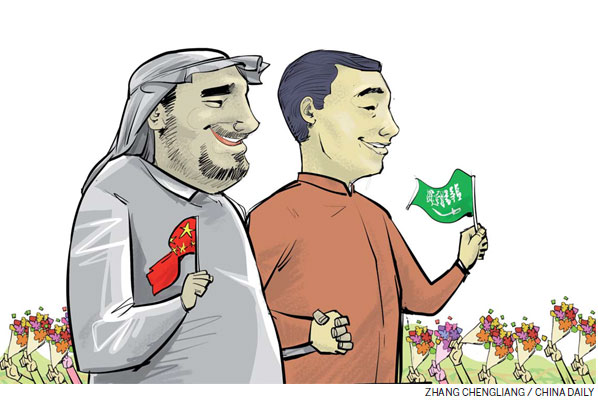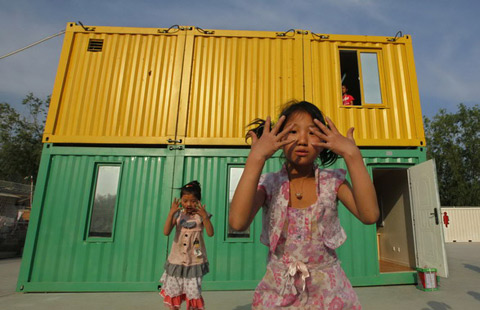Strategic ties that stabilize the world
Updated: 2014-03-28 08:41
By Robert Lawrence Kuhn (China Daily Europe)
|
|||||||||||

China and Saudi Arabia realize close collaboration needed to secure each country's core interests
Rarely in the history of diplomacy does a new bilateral relationship change the existing order. But one was symbolized recently in Beijing by the meeting between Chinese President Xi Jinping and Saudi Arabian Crown Prince and Defense Minister Salman bin Abdulaziz Al Saud. Xi hailed Saudi Arabia as China's good friend, brother and partner, and he welcomed the country to join in building the Silk Road Economic Belt and the 21st Century Maritime Silk Road to promote transportation connectivity and cultural exchanges. The crown prince said his visit aimed to enhance the Kingdom of Saudi Arabia's strategic partnership with China to protect peace, security and stability in the Middle East.
Though there are obvious cultural, religious and historical differences between the kingdom and China, and their policies on sensitive issues such as Syria and Iran may differ, both recognize that to secure each country's "core interests", close collaboration is needed.
Putting principles into practice, a Saudi China Investment Forum was held in Beijing during the crown prince's visit. Attendees included senior Chinese and Saudi officials and business leaders; and I was privileged to participate.
The forum was organized by the Saudi Arabian General Investment Authority, the vision of its governor, Abdullatif Al-Othman. "China is a natural strategic partner for Saudi Arabia," Al-Othman said. "Our complementarities should enhance business and stimulate entrepreneurs." Saudi Ambassador to China Yahya Al-Zaid stressed that the cornerstone of bilateral relations is co-investment from private companies as well as national enterprises.

We began the forum with three premises: mutual dependency on crude oil (Saudi Arabia is China's largest supplier and China is Saudi Arabia's largest customer); economic development as a mutual necessity to create jobs and raise standards of living; and the public commitment of both political leaders to strengthen and broaden economic relations.
We set three objectives for the forum: understanding Saudi Arabia as a country; opportunities in Saudi Arabia as an investment destination; and how to do business in Saudi Arabia.
Understanding Saudi Arabia
The kingdom has the largest oil reserves in the world (more than 20 percent of the world's reserves); it is the world's 19th largest economy (approaching $1 trillion) and the largest in the Middle East. Politically, Saudi Arabia claims commitment to stability and modernity; socially, to education, science and technology, and public services; and economically, to diversifying away from energy and restructuring toward knowledge-based industry.
Demographically, Saudi Arabia's population is almost 30 million, with 50 percent younger than 25 and 35 percent younger than 15. Geographically, the country is located at the crossroads of Asia, Africa and Europe. Culturally and religiously, the kingdom, with the holy cities of Mecca and Medina, is the center and most respected country of the Islamic world.
Opportunities
Industries targeted for high growth include energy, downstream petrochemicals, alternative energy, construction and infrastructure, manufacturing, science and technology, healthcare and medical. Business is facilitated by low-cost inputs (energy and land) and soft government loans (between 50 and 75 percent of investment). SAGIA Governor Al-Othman stressed the "ease of doing business", the "level playing field", and that "no partner is needed and no minimum capital is required". Affirmative financial programs support small and medium-sized businesses. Businesses based in Saudi Arabia may have preferential access to other countries in the region and logistic advantages in Europe and Africa.
How to do business
SAGIA is the one-stop shop for prospective investors in the kingdom, facilitating all aspects of the commercial assessment and investment process. Operated more like a business and less like a bureaucracy, SAGIA radiates an entrepreneurial spirit - Al-Othman was a businessman before being asked into government (he was CFO of Saudi Aramco). The kingdom's two major corporations, Saudi Aramco, the world's largest oil company, and SABIC, a leading petrochemical company, have innovative programs to assist local businesses. Aramco Executive Director Ahmed Al Subaey highlighted Aramco's policy of mandating local content in procurements, such as signing long-term contracts and setting favorable pricings. Aramco may even consider minority investments, Al Subaey said. In addition, the Council of Saudi Chambers, the umbrella organization for more than a dozen local chambers across the country, can introduce local businesses and professionals.
Saudi Minister of Commerce Dr Tawfiq Al-Rabiah highlighted the increased annual trade between China and Saudi Arabia, mushrooming from under $300 million in 1990 to $73 billion in 2012, and how the kingdom's industrial plans resonate with Chinese interests. The president of King Abdulaziz City for Science and Technology, Dr. Mohammed Al-Suwaiyel (who speaks Chinese), arrayed a long list of high-tech research in the kingdom, including water desalinization and a just-signed aerospace agreement with China, through which Chinese rockets will carry Saudi satellites into orbit.
A question raised by the audience was: "Why is Saudi Arabia, with its huge amounts of capital, seeking foreign investment?" Money alone cannot create value, the Saudis explained; technology, knowhow, markets and management are essential for the kingdom's essential economic transformation.
One Chinese company complained that by Saudi Arabia using Western standards to set technical specifications, the Chinese were disadvantaged, even if they offer lower prices. There was also discussion of a large, fixed-price railway construction project in which the Chinese company lost money. That real-world issues were discussed openly and candidly, reflecting the seriousness of the forum.
I stressed that companies need to focus on commercial criteria - profitability and returns - not on political directives, though the support of both governments could help reduce the risk of investments and thus improve the risk/return ratio.
One question thrown at me was whether closer collaboration between Saudi Arabia and China would "threaten" any other country (meaning, with a wispy thin veil, the US). I replied that the US welcomes enhanced international stability and encourages China and Saudi Arabia to assume more of the burden of responsibility in world affairs.
Sulaiman Ababtain, president of Aramco Asia, said "we look forward to deepening our participation in China's society as well as in China's economy". Quoting Aramco CEO Khalid Al-Falih, Sulaiman said: "We do not just sell oil to China, but we are long-term strategic partners with China."
Disclosure: I facilitate business between China and Saudi Arabia. Sure, I see commercial opportunities, but more than that I support the strategic relationship - for the prosperity of both countries and for the stability of the world.
The writer, an international corporate strategist and investment banker, is the author of How China's Leaders Think and the biography of former Chinese president Jiang Zemin. He is a commentator on BBC, CNN, CCTV, Bloomberg and other media.
(China Daily European Weekly 03/28/2014 page12)
Today's Top News
Partnership with Belgium, EU highlighted
Turkish PM wins local elections
Monday's search for MH 370 resumes: AMSA
Families of flight MH370 passengers 'need closure'
Greece passes new reform bill
Dobass demonstrators demand referendum
MH370 relatives demand answers
Turkey starts local elections
Hot Topics
Lunar probe , China growth forecasts, Emission rules get tougher, China seen through 'colored lens', International board,
Editor's Picks

|

|

|

|

|

|





